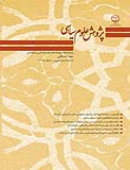مطلقگرايي و نسبيگرايي فمينيستي در ميان زنان شهرنشين ايراني
محورهای موضوعی : پژوهش سیاست نظری
1 -
کلید واژه: ايران شهرنشيني فمينيسم مطلقگرايي فمينيستي نسبيگرايي فمينيستي,
چکیده مقاله :
فمينيسم هر چند كوشش بسياري براي توليد شناخت انجام داده، در تبيين عامگرايي يا خاصگرايي دچار تشتت آرا شده و بارها تغيير يافته است، ميتوان اشتراك نظر كلي ديدگاههاي فمينيستي را در دو زمينه نظري و موضوعي يافت؛ در نظر از قديم قدرت در ميان زنان و مردان نابرابر تقسيم شده و اين امر موجب شده تا مردان، اختيار زنان را در دست گيرند و اگر حقوقي هم براي آنان قائل بوده، مبتني بر برداشتهاي مردانه بوده است و از نظر موضوعي برداشت ميشود كه اين وضعيت در كشورهاي اسلامي و به ويژه در ايران چشمگير است و زنان بايد ترغيب شوند تا سازمان يافته و با نهادهاي بينالمللي، جنبشي اعتراضي به راه اندازند. يك مطالعه ميداني نشان ميدهد غالب زنان ايراني وضعيت ويژهاي را دنبال ميكنند كه سنخيتي با انواع ديدگاههاي فمينيستي رايج در غرب ندارد. آنها بيآنكه سابقه فعاليت سياسي يا اجتماعي گستردهاي داشته باشند و بدون تعصب خاصي درباره جنسيت، تنها به پيگيري غيرسازمان يافته مسائل اجتماعي خود علاقه دارند و حداكثر انتظار زنان تحصيلكرده شهرنشين، داشتن فرصت شغلي برابر و احراز مشاغل دولتي است. زنان ايراني به مطالعه نشريات بينالمللي و ارتباط با گروههاي سازمان يافته خارج از مرزها علاقه ندارند. از اين رو ميزان اثرپذيري آنان از آموزههاي فمينيستي خارجي بسيار كم است. وجه مشترك ميان زنان ايراني و جنبش فمينيسم در موضع نقادانه آنان در برابر يک نظام سختگيرانه مردسالارانة سايه افكنده بر زندگي اجتماعي و خصوصي آنهاست.
Feminism tries to change the social structure, just like any other social movement. Feminism has gone trough many changes and evolutions. But the common point among all different Feminist views is that power has always been unequally distributed among men and women and this has led to the supremacy of men over women so that the knowledge and the current women’s rights has been written by and based on this supremacy. Feminism is to organize women in many countries with the help of multilateral institutions to fight against male supremacy and to empower and advance the world’s women and to re-examine all schools of knowledge and to reveal the extent to which they ignore or distort gender. However, this field study on the Iranian women residents in over 30 cities, from university educated to semi-illiterate, wealthy to poor, old to young, government employee to jobless and from married to single, shows that most Iranian women, regardless of their different tendencies of fundamentalism, reformism and secularism, lacked any political activity and even any notable and satisfactory social experience. They mostly dislike political parties and groupings even the ones run by women or for women; and if there was any trend towards the social activities, it would be unorganized and unbiased from gender point of view. Nevertheless, the common characteristic of the urban Iranian women is their critical position against a patriarchal system cast in both public and private life with regardless their private or public institutions being religious or secular.

